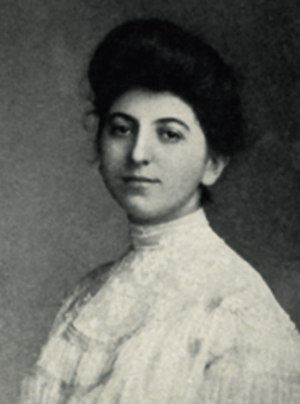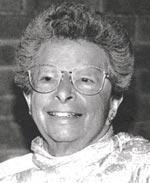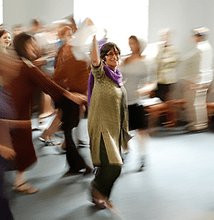Fanny Fligelman Brin
Educator and founder of the World Affairs Council and Center at the University of Minnesota, Fanny Fligelman Brin (1884–1961).
Image courtesy of the University of Minnesota Alumnae Association via The Washington Nuclear Museum and Education Center.
Fanny Fligelman Brin began her social activism as a suffragist when she was a student at the University of Minnesota student from 1902 to 1906. Later, during the interwar years, she mobilized support for international peace efforts. Brin directed world disarmament protest activities in Minneapolis, and by 1924 she was both president of the local section of NCJW and chair of its national subcommittee on peace. During her tenure as NCJW’s national president, the first elected outside the East Coast, she changed the organization’s focus from social service to peace activism. She also served on the executive board for the National Committee on the Cause and Cure of War for fifteen years, mobilizing public opinion for world disarmament. Brin was selected as an alternate consultant on the U.S. delegation to the United Nations Conference in 1945.
Introduction
Although named as one of the ten most influential women world leaders in America in 1934, Fanny Fligelman Brin saw no paradox between her national stature and her husband’s expectation that she be present when he came home for his noontime meal. In this melding of civic and domestic responsibilities, Brin was emblematic of her generation of American clubwomen. A riveting public speaker, masterful politician, and skilled organizer and administrator, Brin, who served two terms as president of the National Council of Jewish Women (NCJW), from 1932 to 1938, is best remembered for her work on behalf of world peace during the interwar years.
Family, Education, and Suffrage Activism
Fanny Fligelman was born on October 20, 1884, in Berlad, Romania, and emigrated to the United States with her mother and stepsister just three months later. Her father, John Fligelman, had traveled to Minneapolis ahead of them; he had a yeshiva education but turned against it in favor of a new American life. Her mother, Antoinette (Tova) Friedman, spoke Romanian and Yiddish and some French and very much believed in the importance of education for women. The family settled in Minneapolis, where another daughter and three sons were born. John eked out a living in a jewelry and watch repair business. Antoinette, the practical one, encouraged her daughters’ educational aspirations, and both attended the University of Minnesota (Fanny from 1902 to 1906) at a time when it was highly unusual for women to receive a college education. (Her brothers did not go to college and had to help support the family, working from their early ages.)
While at the University of Minnesota, Fanny Fligelman was influenced by her professor, Francis Squire Potter, a suffragist. Her work as a young suffragist launched her career as an activist. This was her first experience organizing and working primarily with other women for a cause she deemed imperative. She was also an award-winning debater and eloquent speaker, graduating Phi Beta Kappa in 1906. She was passionate about women’s rights, concerned not only with the vote, but also with the right to birth control and family planning.
In 1913 Fanny Fligelman married Arthur Brin, a prosperous glazing contractor and president of the Brin Glass Company. He remained an important and active member in many Jewish fraternal and service organizations until his death in 1947. The Brins had three children: Rachel (1915–2008, a social worker who married Ralph Helstein), Howard (1919–1988, president of the Brin Glass Company and community activist, who married Ruth Firestone), and Charles (1923–2016, an actor whose life partner was Beryl Greenberg). The Brins lived most of their married life in an upper-class neighborhood in Minneapolis.
Peace Work
With the help of a cook and an upstairs maid, Brin started her career of unpaid public service, balancing family life with her passion for women’s rights, social justice, pacifism, and the Jewish community. She became a world-renowned radio speaker on these causes, and she traveled to multiple cities all over the United States over several years.
Brin was invited to join a variety of exclusive cultural clubs, apparently experiencing little antisemitism. Her interest in peace issues is evident in her work within and outside NCJW. In 1921, she directed world disarmament activities in Minneapolis. Three years later, she was both president of the Minneapolis Section of the NCJW and chair of its national subcommittee on peace. Her efforts on this subcommittee continued when she became national president (1932–1938), resulting in the organization spending more time on peace issues than social service.
Through NCJW peace work, Brin became involved with the National Committee on the Cause and Cure of War (NCCCW), founded in 1926 by Carrie Chapman Catt, whom she had met through their mutual suffrage work. Brin served on the executive board of the NCCCW for fifteen years. She effectively mobilized Minneapolis public opinion for the Kellogg-Briand Pact and, in 1931, for world disarmament. In 1938, she went on a Christian-sponsored tour, speaking in Germany just before World War II engulfed the world.
In 1944, Brin called together 36 Minneapolis women’s groups to form the Women’s UN Rally, a focal point of United Nations Week activities. She also helped found the World Affairs Council and Center at the University of Minnesota. The capstone of her peace career was being chosen an alternate consultant on the United States delegation to the United Nations Conference on International Organization (commonly known as the “San Francisco Conference”) in 1945.
Brin drew upon Judaism for humanistic rather than ritualistic themes. She was a latecomer to Zionism, eventually helping to raise funds for causes in Israel; a community center was named for her in Beer Sheva before her death. Mainly she was a daughter of her era; she felt that women could educate and persuade society of the linkage between democracy and peace. Parkinson’s disease disabled her, stilling her remarkable voice; she died on September 4, 1961.
Legacy
Brin's granddaughter, Rabbi Deborah Brin, made a public address honoring Fanny Fligelman Brin at the rotunda of the Minnesota State Capitol on September 8, 2019, the state’s official 100th anniversary of women’s suffrage. In 2020, on the occasion of the 100th anniversary of women's suffrage in the United States, both the Minnesota History Center Museum and the Hennepin County Museum had exhibitions featuring Fanny Brin as one of Minnesota’s important suffragists. Brin is also honored at the Minnesota State Capitol in a monument to Minnesota women suffragists.
AJYB 64:492.
Bluestein, Dale. “To Repair the World: Jewish Charities and Social Action.” Jewish Historical Society of the Upper Midwest video, 14:04. https://vimeo.com/682577706/f2ddfe596d.
Brin, Fanny Fligelman. Papers. Minnesota Historical Society, St. Paul.
Brin, Ruth. “She Heard Another Drummer: The Life of Fanny Brin and Its Implications for the Sociology of Religion.” Master’s thesis, University of Minnesota (1972).
DePietro Rosella. “Not an Idle Woman; Fanny Fligelman Brin, A Granddaughter’s Remembrance.”* Hennepin County History Museum Magazine, vol. 79, no. 1, 2020.
*Brin’s granddaughter Judith Brin Ingber.
Klapper, Melissa R. Ballots, Babies, and Banners of Peace: American Jewish Women's Activism 1890-1940. New York: New York University Press, 2013.
Obituary. NY Times, September 7, 1961, 35:1.
Stuhler, Barbara. “Fanny Brin: Woman of Peace.” In Women of Minnesota: Selected Bibliographic Essays, edited by Barbara Stuhler and Gretchen Kreuter. St. Paul: Minnesota Historical Society Press, 1977.
UJE.
WWIAJ (1926, 1938).
WWWIA 7.






